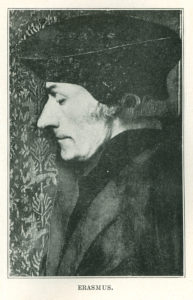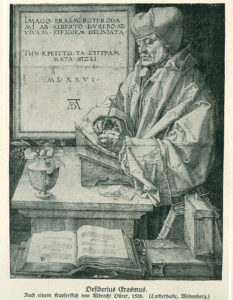by Rev. A. Brian Flamme

There are few men of the 15th and 16th centuries that deserve our attention more than Erasmus Desiderius of Rotterdam. He represents the pinnacle of Christian humanism, an intellectual movement that revitalized classical and biblical scholarship north of the Alps.
There is some confusion over the date of his birth since it seems that Erasmus was careful to conceal the fact of his illegitimacy, but most scholars date it around 1469. His education began with the Brethren of Common Life and continued at their seminary before he entered the Augustinian Canons. By 1492 he entered the priesthood, but his heart was not in praying the hours or sacrificing the mass. His encounters with classical and patristic literature set the course of his life’s scholarly work in the universities and among the intellectual elites of England, France, and Germany. At the height of his powers and influence, Erasmus was called “prince of the humanists.”[i] Some of his most famous literary contributions include The Handbook of the Militant Christian (1503) where he articulates his ethical and undogmatic “philosophy of Christ,” The Praise of Folly (1509) dedicated to his dear friend Thomas More, a critical edition of the Greek New Testament (1516), and his Diatribe on the Freedom of the Will (1524) directed against Luther and his followers. He died on June the 12th, 1536 in Basel, Switzerland.
When we hear the word “humanism” today, we think of a movement of secular atheists who desire nothing more than to crush religion and tradition under the progressive boot of modernity. But classical humanism, championed by the likes of Erasmus, More, Lefèvre, and Reuchlin, was not progressive in the modern sense, but conservative and restorative. Christianity was not the enemy. She was the precious jewel that had lost her luster in the grime of scholastic neglect and clerical corruption.
Rather than being content to uncritically perpetuate the traditions, educational techniques, and institutions of the middle ages, Erasmus and the humanists returned to the sources of ancient wisdom and the Christian faith to find a better way. To that end they mastered Greek, Hebrew, and Latin. They studied the syntax, grammar, and vocabulary of Cicero. They ignored Aquinas, Biel, Scotus, and Ockham to study Jesus, Paul, John, Jerome, and Augustine.

In their eyes the difference between the religion of the Scriptures and current state of Christendom was deplorable. To effect change they dedicated their lives to establishing educational programs that communicated the simple precepts of the Bible and the long-forgotten truths of the ancients.
As you can imagine, humanism and the Reformation had a lot in common. Harold Grimm writes, “Although humanism was by no means identical with the Reformation and did not lead directly to it, it did much to prepare the way. The most obvious contributions of the humanists were their philological techniques and experience, acquired in the study of the classics, and their interest in and publication of patristic literature and biblical texts.”[ii] In other words, the linguistic tools and biblical sources that helped Luther, Melanchthon, and the other Wittenberg theologians argue for the doctrine of justification were available because of humanism.
You would think that Erasmus and his cohorts would be all too willing to join with Luther against the papacy. But that was far from the case. Luther’s concern was for doctrine. Erasmus was decidedly against doctrine and dogmas. To him, Christianity was an ethical affair. It meant being transformed in the heart to be a better person like Christ himself. He writes,
“This kind of philosophy is situated more truly in the emotions than in syllogism, it is a life rather than a disputation, an afflatus rather than erudition, a transformation rather than reason. To be learned is the lot of only a few; but no one is unable to be a Christian, no one is unable to be pious, and I add this boldly, no one is unable to be a theologian. For that which is most of all in accordance with the nature descends easily into the minds of all. But what else is the philosophy of Christ, which he himself calls a rebirth, than the instauration of a well-founded nature?”[iii]
That might sound like something Luther would write, but these men and their ideas could not be farther apart. There is nothing here of the doctrine of justification by grace through faith. If anything, it rewords the corrupted doctrine of justification that rests on an individual’s reparation of nature through works, in eloquent yet undogmatic language.
For all his desire to see changes within the church, Erasmus still held tight to the prevailing errors of his day: the dignity of man and salvation that comes from cooperating with God’s grace by works. His loyalties to error and his great distaste for any sort of conflict in the church finally drove him to writes his Diatribe against Luther.

Erasmus refused to let the Scriptures speak clearly on doctrine, especially that of man’s bound will that cannot choose God and godliness. Erasmus writes,
“There are some things which God has willed that we should contemplate, as we venerate himself, in mystic silence; and, moreover, there are many passages in the sacred volumes about which many commentators have made guesses, but no one has finally cleared up their obscurity: as the distinction between the divine persons, the conjunction of the divine and human nature in Christ, the unforgivable sin; yet there are others things which God has willed to be most plainly evident and such are the precepts for the good life.”[iv]
This short list of “obscurities” are telling. They have everything to do with what we confess clearly in the creed and hold to by faith. Undogmatic indeed! Erasmus only has eyes and ears for the law, the precepts “for the good life”, as he calls it. What might be gleaned from the Scriptures about God’s work in the person of Christ and the faith that clings to his Word are nothing but fodder for “mystic silence.”
Luther refuses to concede the Scriptures as a book full of confused articles of doctrine. He desires clear and unequivocal assertions, assertions about the person and work of Christ, faith, and the inability of man to choose or work toward his salvation. Luther says in his response to Erasmus, On the Bondage of the Will, “The Holy Spirit is no Skeptic, and it is not doubts or mere opinions that he has written on our hearts, but assertions more sure and certain than life itself and all experience.”[v]
If you want to get to the heart of the conflict between Erasmus and Luther on the issues of faith, works, bound will, God’s foreknowledge, or anything else, then you must see the foundation upon which both men stand. Erasmus was indeed a biblical scholar, but he so detested conflict that he refused to let the Scriptures speak for themselves. For all his love of eloquence, the Bible’s clarity meant little. His “Philosophy of Christ” was based on nothing more than what most people today would call “religion”: an inarticulate preoccupation with being a good person. On this point, we would do well to recognize that Erasmus’ humanist legacy has overcome the Reformation in the judgments of individualistic modern western society. In that sense, Erasmus was a man ahead of his time. Luther’s love of theology and doctrine may have lost popularity, but that does not make him wrong. Despite the upheaval around him in the world, Luther fought because he knew that Jesus would not share his glory with our works. He desired the greater peace and unity not of this world, but of faith in Christ.
 The Holy Ghost is no more a skeptic today as he was five hundred years ago. He asserts. He gives the Law not as a ladder to reach God (Ps. 143:2; Rom. 3:10), but to expose our weakness and sin (Rom. 3:20). He speaks the mercy and kindness of God as nothing earned, but as a free gift that we have for Christ’s sake (Rom. 3:22-25). The Lord does not mumble these truths in a corner. The Scriptures are meant to be asserted in preaching. The Scriptures teach that Christ, God’s true Son, died for you. This is a doctrine that demands and requires faith.
The Holy Ghost is no more a skeptic today as he was five hundred years ago. He asserts. He gives the Law not as a ladder to reach God (Ps. 143:2; Rom. 3:10), but to expose our weakness and sin (Rom. 3:20). He speaks the mercy and kindness of God as nothing earned, but as a free gift that we have for Christ’s sake (Rom. 3:22-25). The Lord does not mumble these truths in a corner. The Scriptures are meant to be asserted in preaching. The Scriptures teach that Christ, God’s true Son, died for you. This is a doctrine that demands and requires faith.
As heirs of the Reformation, we should not shy away from assertions and dogma, nor should we ignore the philological tools of the humanists that allow a clear reading of the Scriptures. Like our fathers in the faith we must hold to Christ’s teachings plainly set forth in the Bible. Our redemption is found nowhere else. Luther says,
“Neither you nor I could ever know anything about Christ, or believe in him and receive him as Lord, unless these were offered to us and bestowed on our hearts through the preaching of the gospel by the Holy Spirit. The work is finished and complete; Christ has acquired and won the treasure for us by his sufferings, death, and resurrection, etc. But if the work remained hidden so that no one knew of it, it would have been all in vain, all lost. In order that this treasure might not remain buried but be put to use and enjoyed, God has caused the Word to be published and proclaimed, in which he has given the Holy Spirit to offer and apply to us this treasure, this redemption.”[vi]
The Rev. A. Brian Flamme is a pastor at Hope Lutheran Church, Aurora, Colo.
[i] Harold Grimm, The Reformation Era: 1500-1650 (New York: Macmillan, 1973), 65.
[ii] Grimm, 71
[iii] Erasmus, quoted in Lewis Spitz, The Renaissance and Reformation Movements: Vol. I (St. Louis: Concordia Publishing House, 1987), 297.
[iv] Erasmus, “On the Freedom of the Will: A Diatribe or Discourse,” in Luther and Erasmus: Free Will and Salvation, Edited by Gordon Rupp and Philip Watson (Philadelphia: The Westminster Press, 1969), 39-40.
[v] Luther, “On the Bondage of the Will,” in Luther and Erasmus: Free Will and Salvation, Edited by Gordon Rupp and Philip Watson (Philadelphia: The Westminster Press, 1969), 109.
[vi] LC, II, 38-39 (Kolb-Wengert, 436).
